 Luxury cars make Asia premiere at Auto China
Luxury cars make Asia premiere at Auto China
 Versatile dog
Versatile dog
 Ni Ni covers BAZAAR JEWELRY
Ni Ni covers BAZAAR JEWELRY
 Cherry blossoms reach peak bloom in Washington D.C.
Cherry blossoms reach peak bloom in Washington D.C.
 Top Chinese fashion icons in foreigners' eyes
Top Chinese fashion icons in foreigners' eyes
 Asia's largest business aviation exhibition to be held in Shanghai
Asia's largest business aviation exhibition to be held in Shanghai
 World's top-rated luxury hotels
World's top-rated luxury hotels
 Wu Jing, Xie Nan to hold wedding on May
Wu Jing, Xie Nan to hold wedding on May
 London Cake International attracts tourists
London Cake International attracts tourists
 Let's dance in harmonic Shaanxi
Let's dance in harmonic Shaanxi
US President Barack Obama's stance on the Diaoyu Islands, which are at the center of a territorial dispute between China and Japan, will be the main focus of Beijing during the president's upcoming visit to Japan.
Obama is set to embark on a state visit to Japan from Wednesday to Friday. It will be the first leg of his four-nation Asia tour, which will also take him to South Korea, Malaysia and the Philippines.
Although China is not on the US leader's itinerary, it is expected to be a major topic throughout the trip, particularly during his trip to Japan.
During the visit, Obama intends to reassure US allies about the huge US influence in the East Asian region while warning China of its presence. Meanwhile he wants to rebalance relations in the region and mend ties between Japan and South Korea, said Geng Xin, a Chinese analyst based in Japan.
Analysts say that the territorial issue, Japan's attempts to ease the limits on its collective self-defense rights and China's role in the region will unavoidably come up in talks between Obama and Japan's rightist Prime Minister Shinzo Abe, who wants to win Obama's support.
The US and Japan were divided when Japan wanted to define in a joint document to be published by Obama and Abe during the upcoming visit that the Diaoyu Islands fall under the security treaty between the two sides. But the US government was unwilling to specifically mention the islets in the statement, apparently because it did not want to unnecessarily irritate Beijing, Kyodo News reported Friday.
US officials including former secretary of state Hillary Clinton had said that the islets fall within the scope of the security pact, but Obama has yet to make such a statement.
"If Obama admits that the Diaoyu Islands fall under Article 5 of the security treaty between the two sides, he will push the US and China to opposite sides. I think Obama is unlikely to specifically articulate that the US will be a shield for Japan, but he will just emphasize the US commitment to Japan's territory in a general way," Lü Yaodong, a research fellow for Japanese studies at the Chinese Academy of Social Sciences, told the Global Times.
Article 5 says that each party of the treaty recognizes an armed attack in Japan-administered territories would be dangerous to its own peace and safety and would act to meet the common danger in accordance with its constitutional provisions and processes.
Earlier this month, US Secretary of Defense Chuck Hagel made strong remarks concerning these issues during his visit to Japan. Hagel urged China, as "a great power," to act responsibly, and reiterated that Washington stood by Tokyo on the mutual defense treaty which applied to the Diaoyu Islands.
Hagel's remarks were challenged by Chinese military officials in a rare use of strong language when he visited China following the Japan trip.
"As Hagel has made clear the US government's stance on its commitment to its ally, Obama is unlikely to make any stronger statements during his visit," Geng said, noting that the US is clearly aware of the importance of China-US ties.
According to the Xinhua News Agency, Japan's Chief Cabinet Secretary Yoshihide Suga said Monday that while the alliance is likely to be reaffirmed, government officials said a "fact sheet" is expected to be issued, rather than a joint declaration, to provide a framework for ongoing bilateral cooperation.
Since the US needs to cooperate with China on both regional and international issues, it prefers to control conflicts that may break out in East Asia as they do not benefit the US, said Yu Tiejun, an associate professor at the School of International Studies of Peking University.
"Obama may suggest both China and Japan keep a mild and pragmatic attitude," Yu said.
Just ahead of the US president's visit, Abe donated on Monday a sacred "masakaki" tree to the Yasukuni Shrine where 14 Class-A war criminals of World War II are honored, but did not visit as he did in December last year.
A group of Japanese lawmakers is expected to visit the shrine during the shrine's spring festival this week.
Suga on Monday said Abe did this as a private individual and so it was not the government's place to comment, trying to downplay the offering.
"It will not have an impact on the US-Japan leaders meeting," he said, according to AFP.
In response, Chinese foreign ministry spokesman Qin Gang said the offering and cabinet members' visits to the shrine exposed the "wrong attitude of the Japanese cabinet toward history."
The shrine issue is a "destructive factor" in the relationship between Japan and its neighbors, and also a "negative asset" for Japan itself, he added.
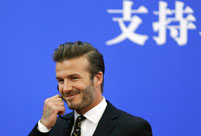 Beckham launches fund to support youth soccer in China
Beckham launches fund to support youth soccer in China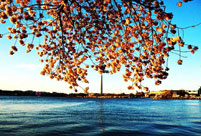 Cherry blossoms hit peak bloom in Washington D.C.
Cherry blossoms hit peak bloom in Washington D.C.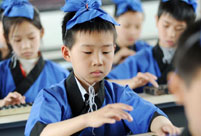 Children in ancient costumes learn Zhusuan
Children in ancient costumes learn Zhusuan Tens of thousands celebrate Water Splashing Festival
Tens of thousands celebrate Water Splashing Festival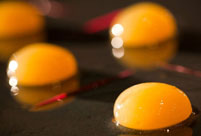 A bite of China II whets the appetite
A bite of China II whets the appetite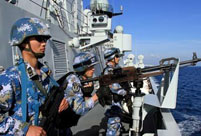 Chinese frigate completes its 14th escort mission
Chinese frigate completes its 14th escort mission Let's dance in wealthy Shaanxi
Let's dance in wealthy Shaanxi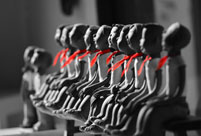 A date with 798: feel the art around you
A date with 798: feel the art around you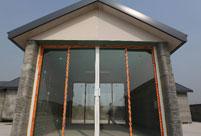 3D-printed houses built in Shanghai
3D-printed houses built in Shanghai The backstage of the Fashion Week
The backstage of the Fashion Week College students in Han costumes
College students in Han costumes Postgraduate works as waitress
Postgraduate works as waitress Life in a Lahu village in Yunnan
Life in a Lahu village in Yunnan An orphan’s wedding
An orphan’s wedding Hollywood documentary brings Diaoyu Islands truth to new audience
Hollywood documentary brings Diaoyu Islands truth to new audienceDay|Week|Month